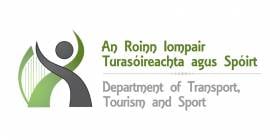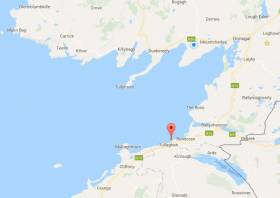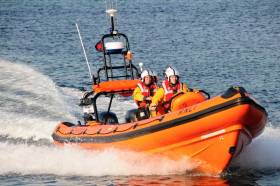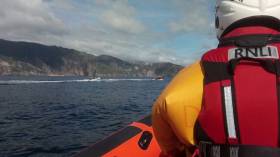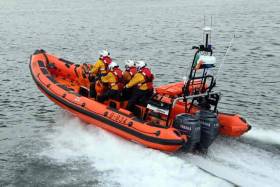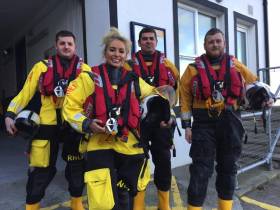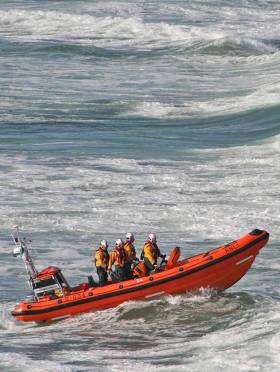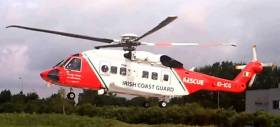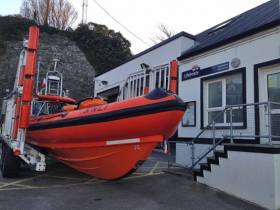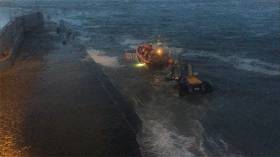Displaying items by tag: Bundoran
Marine Notice: Remedial Works At Bundoran Outfall
#MarineNotice - Marine Notice No 14 of 2018 advises that as part of the Donegal Group B Sewerage Scheme, remedial works are being carried out this week by Norfolk Marine at the Bundoran outfall in Donegal Bay.
These works were scheduled to begin on Tuesday 3 April to last for around one week at 54° 28.778’ N and 08° 19.304’ W, conducted from the vessel Chateau Thierry (Callsign EI-HK-6). An additional small boat or RIB will also be involved in the operation as required.
The work vessel will display appropriate lights and markers, and will monitor VHF Channel 16 throughout the project.
Marine Notice: Diffuser Installation Off Bundoran From Monday
#MarineNotice - Marine works, including diving, will be carried out by Norfolk Marine to install a diffuser to the newly placed long sea outfall as part of the Donegal Group B Sewerage Scheme.
The works, which include the installation of a navigation aid to mark the outfall position, are expected to begin on Monday 25 September to last between one and two weeks.
The diffuser location will be west of Bundoran at Latitude 54° 28.778’ N and Longitude 08° 19.304’ W.
The diving and installation works will be carried out from the vessel Chateau Thierry (Callsign EI-HK-6). An additional small boat or RIB will also be involved in the operation as
required.
The vessel will display appropriate lights and markers, including the diving ‘Alpha Flag’ during diving operations. Vessel moorings will be marked with appropriate buoys. The vessel will monitor VHF Channel 16 throughout the works.
Further details are included in Marine Notice No 40 of 2017, a PDF of which is available to read or download HERE.
#Rescue - Bundoran RNLI is reminding anyone planning a trip to the coast this summer to be mindful of the dangers of rip currents that can quickly sweep you out to sea.
The advice comes as Bundoran’s volunteer lifeboat crew launched yesterday morning (Saturday 15 July) following reports of several people in difficulty in the sea off Tullan Strand.
It emerged that a group of GAA footballers had been training on the beach and went swimming to cool down following their session.
The strong currents at Tullan soon began to carry a number of them out to sea and into the rocks.
Concerned onlookers immediately called the Irish Coast Guard, and within minutes both the inshore lifeboat from Bundoran and the Sligo-based Rescue 118 helicopter were at the scene.
Meanwhile, a group of quick-thinking surfers — one of whom is crew member with Bundoran RNLI — entered the water on boards and helped the footballers to safety.
On arrival, the lifeboat ensured that all casualties were out of the water, while Rescue 118 landed on Tullan Strand and also made sure that everyone was accounted for.
The lifeboat crew trained in first aid assisted eight of the players, some who were bruised and some who had swallowed sea water before ambulances arrived.
A number of the casualties were taken to Sligo University Hospital as a precaution.
Following the incident, Bundoran RNLI helm James Cassidy reminded anyone planning a trip to the area of the potential dangers.
“Thankfully everyone is safe this afternoon and we would like to wish the group well following what must have been a frightening experience,” he said.
“We would remind locals and visitors alike that Tullan Strand and particularly the area along the cliffs is notorious for rip currents and under currents and is really not suitable for swimming.
“Rips are strong currents running out to sea which can catch even the most experienced beachgoers out. They can take you from the shallows very quickly and leave you out of your depth.”
Cassidy said Bundoran’s main beach is supervised by lifeguards all summer long and provides the best option for safe, supervised swimming during the summer period.
“Should you get caught in a rip, the best advice is to stay calm and don’t panic,” he added. “If you can stand, wade. Don’t try to swim. If you have an inflatable or board, keep hold of it to help you float. Raise your hand and shout for help loudly.
“Don’t swim directly against the rip or you will get exhausted. Swim parallel to the beach until free of the rip, then make for shore.”
Further sea safety advice can be found on www.respectthewater.com.
Bundoran RNLI Lifeboat Assists Broken Down Boat
On Sunday afternoon, May 28th, the volunteer crew of Bundoran RNLI lifeboat was requested to assist a rib with four persons on board which had broken down off Malinbeg, close to Rathlin O’Beirne Island.
The alarm was raised around 3:45pm by a person on the land who called the Coast Guard at Malin Head. The Bundoran lifeboat crew was requested to launch shortly afterwards with the Killybegs Coast Guard crew also tasked.
On arrival at the scene, the crew of the Killybegs Coast Guard had taken the rib with its four crew members under tow to Teelin Harbour. The Bundoran Lifeboat accompanied both vessels to Teelin and then returned to Bundoran arriving around 5:45pm.
Killybegs Coast Guard RIB Takes Dive Boat Under Tow
The volunteer crew of Bundoran RNLI Lifeboat were requested to launch this afternoon to assist a dive boat with 4 persons on board, which had broken down.
The alarm was raised around 1:50pm with Malin Head Coast Guard who immediately requested the launch of the Bundoran Lifeboat and also tasked the Killybegs Coast Guard RIB.
The Bundoran Lifeboat launched at 2pm to the dive boat which was around a mile north of Bullockmore, (west of St John’s Point). The Killybegs Coast Guard rib took the dive boat under tow to Killybegs Harbour with the Bundoran Lifeboat accompanying both vessels.
On returning to the station around 90 minutes later, Volunteer Lifeboat Crew member with Bundoran RNLI Richard Gillespie said ‘the people on board the dive boat were absolutely correct to call the Coast Guard and have ourselves and Killybegs launched. While they were in no immediate danger, the longer they left the call, the more chances there were of something going wrong. We would always encourage boat users to contact the Coast Guard on the first sign of a problem so we can be there to help sooner rather than later.’
Cliona Hagan To Play Bundoran RNLI Annual Dance
#RNLI - Country singer and RTÉ’s Best Newcomer 2016 Cliona Hagan is set to perform at the annual Bundoran RNLI dance, which takes place on Friday 27 January at the Great Northern Hotel in Bundoran.
The event, now in its 42nd year, is the flagship fundraising event for the charity that saves lives at sea and is a hugely anticipated staple in the local calendar.
“This is a huge fundraising night for us and we are forever grateful to our local supporters who come out in such great numbers each year,” said event director Cormac McGurren.
“I’d also like to acknowledge the sponsors of our raffle prizes who give so generously each January.
“We have decided to try out a less formal buffet-style this year and we hope that everyone attending will enjoy a good night of music and food.”
Speaking at the launch, Cliona Hagan said: “I’m really looking forward to playing at this prestigious event and supporting this great charity – I’ve heard such great things about the night and it promises to be a good one!”
Tickets are on sale locally from all lifeboat crew members, BMG Hardware Bundoran, McNern Barbers Ballyshannon, Temptations Beauty Studio Ballyshannon, O'Neill's Next Door Off Licence Ballyshannon and Bundoran Tourist Office.
All funds raised on the night remain at the local station in Bundoran and go towards crew training and maintenance of the boathouse and lifeboat itself.
Teenage Girls Want to Say Thanks to Bodyboard Rescuers
Four teenage girls who got into trouble whilst swimming at Main Beach in Bundoran on Saturday (17th September) have issued an appeal to find the body boarders who helped them out of the water.
The girls were in the water just after 6.30pm on Saturday evening when they found themselves caught in a rip current. A member of the public dialled 999 and the Bundoran RNLI Lifeboat and Rescue 118 helicopter were both requested to launch by Malin Head Coast Guard. Within minutes the Bundoran Lifeboat was on the scene having made the short trip from the nearby station, however, on arrival the girls had already been helped to safety by a number of bodyboarders who were in the water at Main Beach at the time.
A number of RNLI volunteer shore crew, trained in Casualty Care, also attended the scene and assisted the girls until the arrival of the Sligo based Rescue 118 helicopter which landed in the Astoria Car Park.
As a precautionary measure, the girls were airlifted to Sligo University Hospital from where they were subsequently released after having been given an all clear.
Now the girls are appealing for their rescuers to come forward so that they may thank them in person.
Search Resumes For Swimmer Missing Off Bundoran
#Missing - The search resumed at first light this morning (Wednesday 24 August) for a swimmer reported missing off Bundoran in Co Donegal yesterday evening.
BreakingNews.ie reports that the man got into difficulty while swimming at Tullan Strand.
The alarm was raised by a beachgoer in the adjacent car park after a group of swimmers called for help, according to RTÉ News.
Bundoran RNLI and the Irish Coast Guard's Sligo-based helicopter Rescue 118 are involved in the search that was suspended overnight.
Bundoran RNLI Soapbox Race Returns For Fifth Year
#RNLI - The eagerly anticipated Bundoran RNLI Soapbox Race makes its return to Bundoran’s Astoria Road on Bank Holiday Sunday 5 June.
Following last year’s cancellation of the event due to unfavourable weather conditions, the volunteer lifeboat crew are this year determined to make the fundraising event even better than ever.
The current holders of the title of soapbox champions are Bundoran’s Ward Automation and they are anxious to retain their title.
Spectators can expect the usual excitement that they have grown to expect since the event began back in 2012 with participants encouraged to begin the build of their soapbox so that it is ready on time.
The €1,000 ball race will also make a welcome return on the day with balls being sold for €5.
Each ball is numbered and then released down the hill. The first ball through the funnel at the end will win the €1,000 which has been donated by local businesses. Balls will be on sale on the day.
The event will kick off at midday with a skate competition as local longboarders display their skills in advance of the soapbox race. The soapbox race will follow with the day coming to a close with the ball race.
Bundoran RNLI event co-ordinator Cormac McGurren is encouraging all budding soapboxers to start building.
"The countdown is on and we want to see as many soapboxes taking part as is possible," he says. "We would love to see all the local businesses involved and competing against each other to have plenty of friendly rivalry on the day.
"We would also encourage locals and visitors alike to come along and enjoy a good day out. All proceeds raised will go to helping our volunteers in Bundoran to continue to save lives at sea."
All the details of the day, including registration forms, can be found online at www.bundoranlifeboatsoapboxrace.com
Bundoran RNLI Lifeboat Called To Surfers in Difficulty
The volunteer crew of Bundoran RNLI lifeboat were requested to launch yesterday evening (Saturday 9th April) to reports of surfers in difficulty off Tullaghan in County Leitrim. The 999 call was made by a member of the public who noticed the surfers struggling to make their way back to shore.
Within minutes the lifeboat launched in challenging conditions and made its way to the scene where the Sligo based Rescue 118 helicopter, who were returning from another incident, had already lifted one of the surfers out of the water. The other surfer was then lifted from the water by the lifeboat. The helicopter landed and handed over the surfer they had lifted to RNLI shore crew. Neither surfer needed medical assistance.
On their return to the the lifeboat station helm Brian Gillespie said 'the surfers had luck on their side with the helicopter passing and our boat being able to launch in such challenging conditions. The outcome was positive on this occasion and we are thankful we were able to get to the surfers on time. We would like to remind anyone who sees anyone in trouble on the coast to ring 999 or 112 and ask for the Coast Guard.



























